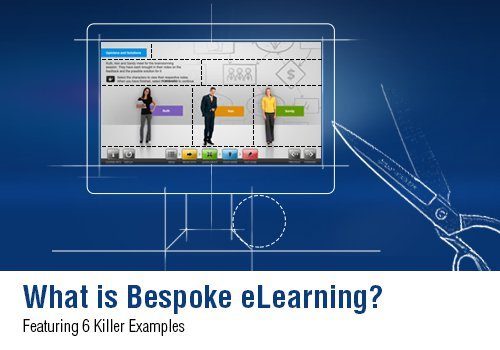Bespoke eLearning
It is evident from the fact that the same concept when taught interestingly shows much more learning impact than plain or boring content. Interest and user engagement play a major role in learning. One of the many ways for user engagement is customization and personalization of content. Here comes the concept of off-the-shelf and bespoke eLearning. To understand the concept, let’s take the example of two companies X and Y, and an eLearning service provider P.
Suppose X is a retail bank and Y is a non-banking financial institute that deals in car and home loan financing. Both of them need to train their employees on KYC and AML guidelines as per the government norms. They approach P for an eLearning program on KYC/AML. P offers them two options: an off-the-shelf KYC/AML module and a bespoke module.
The off-the-shelf module is ready to be deployed and costs less. The content is a standard training module on KYC and AML guidelines. There will not be any industry-specific examples or scenarios. So if X and Y choose the off-the-shelf module, then they will get the same module with the same look and feel and the same content. However, if they choose the bespoke mode, the content will be personalized, as per the client’s industry and examples, scenarios, and other company-specific details can be added as deemed necessary.
Thus, company X's module will include examples and scenarios pertaining to retail banking customers and how the rules apply to them. On the other hand, that of company Y will include examples and scenarios pertaining to car and home loan customers and how the rules apply to them. So, the module for company X will look and feel different than the module for company Y though both will essentially leverage the same technical knowledge.
In a nutshell, bespoke or custom eLearning modules are tailored to cater to a particular audience while off-the-shelf is generic. There is a huge demand for off-the-shelf modules. However, most of the industries prefer bespoke eLearning as there are many advantages.
Key Features Of Bespoke eLearning
Before we discuss the benefits of bespoke eLearning, let’s have a look at some of the key features of bespoke eLearning that distinguish it from off-the-shelf modules:
- Branding
Bespoke modules have the organization’s branding, thus making it more familiar and relatable. - Familiarity
Bespoke modules have an organization-specific design and User Interface, which is not possible in off-the-shelf modules. This makes the navigation and User Interface familiar for the audience. - Voice over accent
Bespoke modules can have a preferred voice over accent, as per the audience. - Content and instructional strategy
A bespoke module can have a tailored content and instructional strategy.
The key features of bespoke modules are customization and personalization. Let’s now look at what benefits can be reaped from this feature:
- Maximum learning impact
The learning outcome is not only dependent on technical content, but also on how the content is presented and how well the user engages with the content. Bespoke eLearning ticks all the boxes here as it allows maximum tailoring of the content and instructional strategy as per the user profile. Thus, it maximizes the learning impact. - The only option for organization-specific content
Bespoke eLearning is the only viable option when it comes to imparting learning on organization-specific content. - User-centric design
Bespoke modules can be designed in a user-centric way rather than a content-centric way. This makes a huge difference in user engagement and maximizing learning outcomes. - Control on cost
Off-the-shelf modules come with a fixed cost. Bespoke modules can be created as per budget. - Content updates
If the content gets updated, off-the-shelf models become useless but bespoke modules can be modified as required, either in-house or by employing a learning partner.
Disadvantages Of Bespoke Modules
Despite all the benefits, bespoke modules have some drawbacks. Let’s look at some of these:
- High initial cost
Bespoke modules are much more costly, as the entire cost of production is borne by the organization. Off-the-shelf modules have a very minimal cost. - Deployment time
Bespoke modules take a long time for deployment, as the entire module is built from scratch. - Project management
Creating bespoke modules involves a lot of activities even if outsourced. This may consume the production time of subject experts and other staff. - Lack of universality
Off-the-shelf modules use industry experts who come from different backgrounds and thus contribute to the versatility of the content. Bespoke modules are usually created by a single expert and thus may contain bias.
Conclusion
Doubtless, bespoke eLearning is going to be the way even if the content is generic in nature, whereas off-the-shelf modules offer a cost-benefit. The benefits outweigh the disadvantages. The possibilities with bespoke eLearning are limitless.










